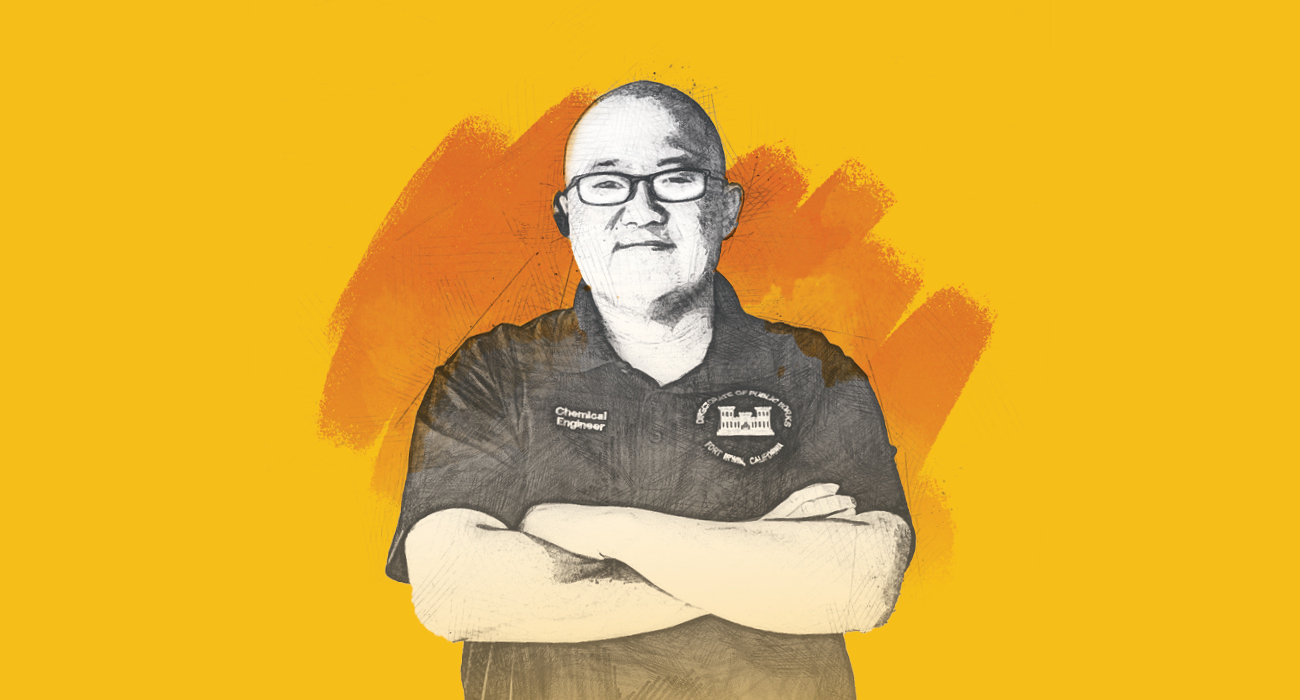Duo Zhang
Duo Zhang, an alumnus of the McKelvey School of Engineering and a soldier in the U.S. Army, earned a master’s degree in chemical engineering in 2021 despite his studies being interrupted by multiple deployments and the COVID-19 pandemic.
He’s now a chemical engineer and contracting officer representative for the Army’s National Training Center
at Fort Irwin in San Bernardino County, California. We spoke to Zhang about his experiences and how they helped him to be a better soldier.
Q: Why did you decide to continue your education?
A: The Army encourages all soldiers to go back to school and will pay their tuition. I enlisted as a nuclear, biological, radiological and nuclear specialist and knew I wanted to learn more so I could better serve the Army. I’ve always wanted to go to WashU, and this was my opportunity.
I decided to study engineering because it was a new concept for me. Mathematics and computer science are concepts we use in engineering that I didn’t deal with as a chemistry major.
Q: What was it like returning to the classroom?
A: I started in the spring semester of 2019 before I was deployed, which was tough because I had just started getting used to being a new student. Plus, as a chemistry major with no engineering background, it was hard for me to catch up that first semester. I had been out of school for so long.
It was very different being back in the classroom. In the Army, we’re expected to listen to orders. We do the job and report back. There are also certain procedures we always have to follow. In the classroom, the professors will ask a question and we’re expected to give feedback. We can say what we think.
Q: Were there any resources that helped you to adjust to life back on campus?
A: Professors Yinjie Tang and Fuzhong Zhang, both professors of energy, environmental & chemical engineering, were patient in helping me. I would go to their office hours, and they’d tell me what I should know before I came to their lectures. Professor Tang also introduced me to Garrett Roell. He was a fourth-year doctoral student who became my mentor. He would help me in the labs and would also let me shadow him during his work.
The WashU Office of Military & Veteran Services sent my team and me seven care boxes during our Operation Spartan Shield deployment in the Middle East. These boxes included food, toiletries and two WashU T-shirts. I was touched by that.
Q: Can you describe some of the projects you’ve worked on since earning your master’s degree?
A: Fort Irwin is in the Mojave Desert. The Army wants to keep working in this zone, but they can’t without a source of clean water. Before they used recycled water, but now there is an irrigation system that handles potable water, non-potable water, green water and more.
When I got here, the colonel in charge of the garrison asked me to put together a report on what improvements could be made to the water system. The data that was provided to me to review was from the 1980s. I worked with contractors and environmental officers to update the fort’s data and improve the models they were used in. Last summer, the secretary of the Army came to Fort Irwin and reviewed the report. She approved it, and we got $12 million to make the updates. I was prepared for this project by what I learned in Professor Young-Shin Jun's class.
Q: You’re a chemist, a soldier and an engineer. How have these different experiences helped to get you where you are now?
A: WashU gave me the knowledge and skills to serve, while the Army gave me a job and the opportunity to improve. The Army also taught me values such as integrity, loyalty and discipline that helped me to not give up on difficult papers or projects in the classroom.

